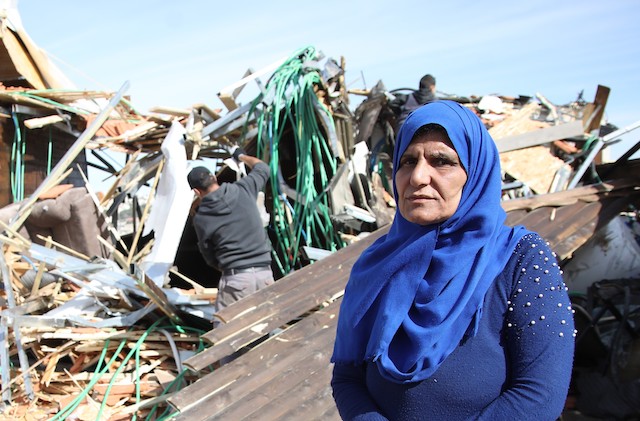The House Resolution Condemning Palestinian Human Rights Movement is Blatantly Wrong [OP-ED]

In a disappointing move, Congress has overwhelmingly voted to condemn a grassroots human rights campaign: the boycott, divestment and sanctions (BDS) movement for Palestinian rights.
The House resolution, passed on Tuesday (July 23), claims that the boycott movement is, “questioning and undermining the very legitimacy of [Israel] and its people" rather than being focused on racial justice and social change for all. The bill also posits that BDS “seeks to exclude the State of Israel and the Israeli people from the economic, cultural, and academic life of the rest of the world.”
This is not the movement I know. And this resolution is personal to me as someone who has been arrested for supporting this movement.
What is BDS?
In 2005, a diverse coalition of Palestinian civil society organizations issued a call to “people of conscience all over the world” to pressure Israel to abide by international law by engaging in boycott, divestment and sanctions campaigns. This peaceful call for solidarity was modeled after the South African anti-Apartheid movement and seeks to pressure an end to Israel’s military occupation, full legal equality for Palestinians living in Israel, and end of Israel’s 71 years of forced exile for Palestinians refugees.
In the 14 years since then, a range of institutions and individuals from around the world have in some way supported boycotts or divested from Israel or institutions it contracts with. They include the Presbyterian Church, HSBC bank, the Bill & Melinda Gates Foundation, the University of Johannesburg, Michael Bennett, Bishop Desmond Tutu, Ms. Lauryn Hill, the Dream Defenders and many others.
The Israeli government has responded by launching an entire ministry and spending millions of dollars to undermine the boycott movement.
What Happened to Free Speech?
In the U.S., groups including The Israel Project, StandWithUs, and the Emergency Committee for Israel have advocated for state legislatures and Congress to pass anti-boycott measures after losing ground on college campuses.
To date, 27 states have adopted laws targeting the movement for Palestinian rights. In January, the U.S. Senate passed a bill that attempts to authorize state governments to pass anti-boycott laws.
The bill has not advanced in the House of Representatives—in part because these laws violate the First Amendment.
In its place, congressional Israel advocates introduced a nonbinding resolution in March that seeks to condemn the BDS movement. This resolution passed on Tuesday with 398 in favor, 17 opposed, and five abstentions. The most vocal opponents of the resolution were Representatives Rashida Tlaib (D-Mich.), Ilhan Omar (D-Minn.) and Betty McCollum (D-Minn.).
The Congressional Black Caucus, whose members notably advanced boycotts, divestment and sanctions against South African apartheid in the ’80s, largely voted for the resolution. “Squad” member Ayanna Pressley (D-Mass.) split from her crew to vote in favor of the resolution and has faced backlash from progressive supporters.
What’s the Global Context?
In May, the German Parliament passed a resolution labeling the BDS movement antisemitic and calling to cut public funding for projects that support BDS. As a result, MC Talib Kweli was disinvited from a German festival after refusing to disavow BDS.
“The German government is demanding that artists who perform at Open Source Festival, a publicly funded event, denounce BDS as anti-Semitic,” Kweli tweeted. “BDS is not anti-Semitic. This is fascism. I will not be censored.”
The German resolution, like the U.S. resolution, has no legal impact, but Kweli’s experience demonstrates its chilling effect. State governments, corporations and other private actors may feel empowered to attack advocates for Palestinian rights. Activists may also self-censor out of fear of retribution.
I know firsthand the impact of anti-boycott resolutions. In 2015, I was racially profiled, falsely accused, and arrested by Israel while trying to enter the West Bank to speak about Black support for Palestinian rights, including BDS. Since then, Israel has passed a law banning any proponents of BDS—a nonviolent, free speech movement—from entering Israel or the occupied West Bank.
The new House resolution gives cover to these right wing attacks on the right to protest.
I now work for Palestine Legal, which tracks anti-boycott legislation and offers legal support to activists facing censorship. These anti-boycott measures are a harbinger of broader attacks on activism and protest. In our current climate, it is of the utmost importance to protect human rights advocacy and dissent.
The situation on the ground is increasingly dire: This week, Israel demolished dozens of Palestinian homes in Jerusalem that it claims were built too close to its separation wall (an illegal wall under international law). The United Nations tried to condemn the demolitions, but was blocked by none other than the U.S.
My question is this: If international law is unenforceable and nonviolent boycotts and protests are unacceptable, what are Palestinians and their allies supposed to do?
Kristian Davis Bailey is a writer and organizer based in Chicago. He has done extensive work on Black-Palestinian solidarity through Black for Palestine and works at Palestine Legal. His writing has appeared in Colorlines, Ebony, AFROPUNK and Al Jazeera English.
